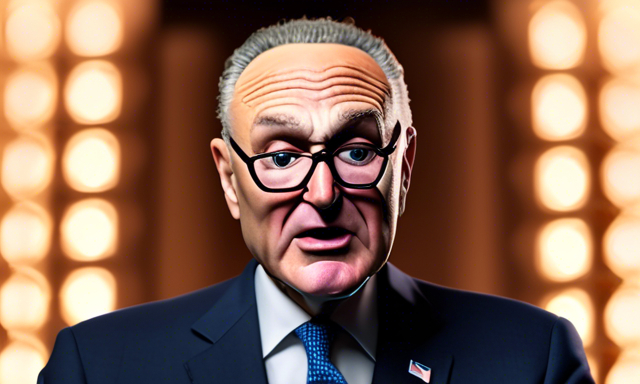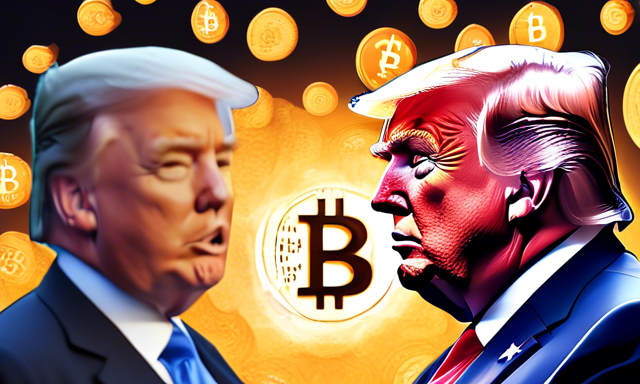Schumer Sidesteps Cryptocurrency in Legislative Agenda 🏛️
Senate Majority Leader Chuck Schumer’s recent legislative framework notably omits cryptocurrency despite previous assurances that it would be a focal point. This year, Schumer provided a summary of priorities, which included significant issues like rail safety, insulin pricing, and advancements in artificial intelligence, yet cryptocurrency failed to find a place on the list.
Commitments Made Earlier This Year 💼
During the “Crypto4Harris” town hall earlier this year, Schumer had emphasized the urgency of establishing a bipartisan regulatory framework for cryptocurrencies by the close of 2024. He articulated his belief that the United States must actively engage in this sector to prevent innovation from migrating abroad.
During the event, Schumer referred to the necessity of balancing tech innovation while simultaneously enforcing sound regulatory measures to protect both consumers and the industry from potential pitfalls. His sentiments were mirrored by Congressman Darren Soto from Florida, who called on Vice President Kamala Harris for decisive action on crypto policies.
This initiative aimed to rally support from the crypto community, especially ahead of the forthcoming elections, featuring a host of notable pro-crypto Democratic figures. Yet, Schumer’s new priorities have left many advocates in the decentralized finance landscape feeling let down.
Community Sentiment and Criticism 🗣️
Throughout the crypto community, discontent has emerged regarding the perceived deep-seated disinterest from the Biden-Harris administration toward cryptocurrency. Notably, there has been a lack of public engagement on this topic from Vice President Harris, further fueling frustrations among crypto enthusiasts. A prominent voice over social media raised concerns that the administration appears to leverage cryptocurrency-linked events solely for political fundraising, failing to show authentic commitment to the community or its policies.
Community members voiced their frustrations openly on platforms like X, with one individual declaring, “Anyone who thinks that Kamala is crypto-friendly deserves to stay poor,” highlighting the apparent disconnect between political rhetoric and actual legislative action.
The Growing Divide: Trump vs. Harris in Crypto 👥
In the political betting sphere on platforms like Polymarket, Donald Trump is gaining substantial ground against Harris, largely attributed to her administration’s cautious approach toward cryptocurrencies. Recent data indicates that 52% of wagers are in Trump’s favor, while 47% support Harris.
This surge for Trump is particularly notable considering his previous drop in popularity following President Biden’s announcement of not seeking re-election. Trump’s favorable reputation among cryptocurrency investors has played a significant role in this shift, thanks in part to his promises to support Bitcoin and bolster blockchain policies, resonating effectively with the pro-crypto demographic.
Conversely, Harris has experienced challenges in maintaining her prior momentum, particularly following the Democratic National Convention, where issues concerning cryptocurrency were conspicuously absent from the agenda. Recently, a group of crypto industry leaders organized a fundraiser intended to benefit Harris, demonstrating an effort to sway her position on cryptocurrency, should she secure the presidential office after the November election.
This fundraiser, taking place on September 13 in Washington, D.C., is aiming for a target of $100,000, with ticket prices set between $500 and $5,000. This effort reflects the ongoing struggle within the crypto community to ensure their interests are recognized in the political arena.
Hot Take: The Importance of Political Engagement in Crypto 🔥
The dynamics of cryptocurrency legislation are evidently complex, intertwining political priorities with the interests of a rapidly evolving technology sector. As the landscape continues to shift, it becomes crucial for leaders from both parties to engage more seriously with the crypto community. This year, the absence of crypto in legislative discussions might signal a broader challenge for the sector, urging advocates to necessitate their voices and influence to ensure that cryptocurrency remains a pivotal part of the national dialogue.
Encouraging a comprehensive understanding of cryptocurrency’s potential can foster an environment conducive to innovation while ensuring the U.S. remains competitive on the global stage. Prevailing sentiments may shift, but active participation and advocacy are essential for the crypto community to fortify its position in the political domain.





 By
By
 By
By
 By
By
 By
By

 By
By